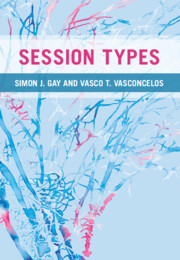4 - Sharing
Published online by Cambridge University Press: 12 June 2025
Summary
The previous chapters present a linear world in which each channel endpoint is possessed by exactly one thread. Linearity allows precise control of interference and that can be useful. If two processes engage in a series of consecutive message exchanges then we can be sure that messages are not sent to or received from foreign processes. Although linearity is often convenient, it can also be detrimental in concurrent systems. Purely linear systems cannot describe e-commerce interactions where a server (or a pool of servers) is expected to serve a much larger number of clients. Linear systems also fail to describe an auction, where at the end, only one bidder is to get the item for sale. This chapter introduces a type discipline that provides for channels that can be shared and consequently for processes that compete for resources, thus creating race conditions and nondeterminism. We do this in such a way that we do not need to revisit process formation or process reduction, and process typing only requires mild changes. We define the language and type system as extensions of those in Chapter 3.
Information
- Type
- Chapter
- Information
- Session Types , pp. 72 - 98Publisher: Cambridge University PressPrint publication year: 2025
